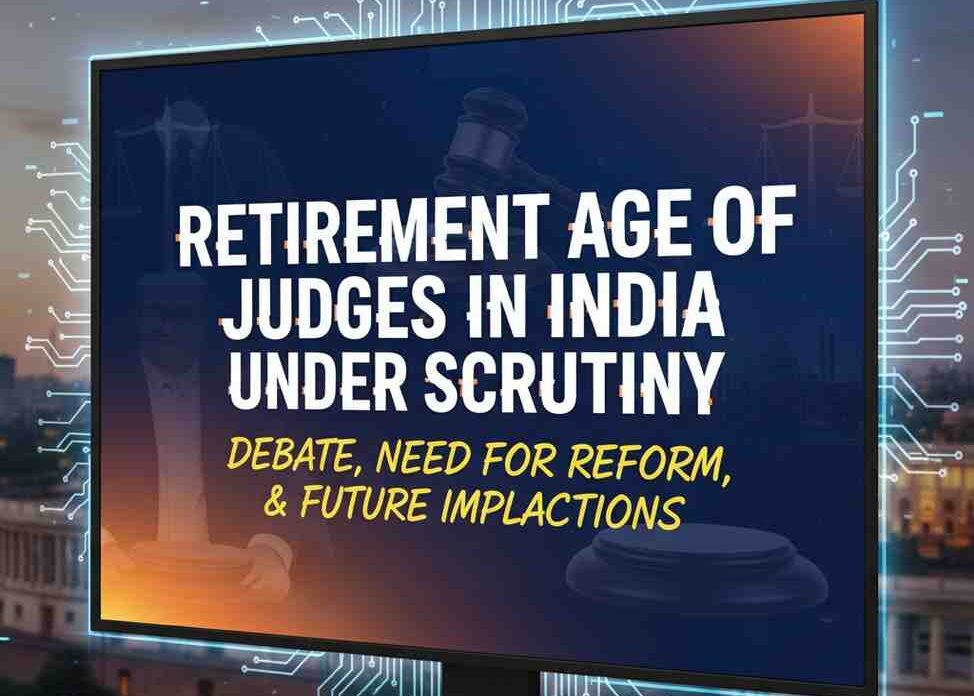The retirement age of judges in India is facing renewed debate. This article explains the current age limits, reasons for reconsideration, arguments for and against increasing the age, and what possible reforms could mean for the judiciary.
Retirement Age of Judges in India Under Scrutiny
The retirement age of judges in India has become a significant topic of discussion in recent years. The Indian judiciary plays a vital role in safeguarding constitutional rights, ensuring justice, and maintaining the balance of power within the democratic system. However, questions are increasingly being raised about whether the current retirement age for judges enables the nation to fully benefit from their experience and expertise.
At present, the retirement age differs across levels of the judiciary:
- Supreme Court judges retire at the age of 65.
- H.C. judges retire at the age of 62.
- Judges in subordinate courts usually retire at around 60, though this can vary slightly between states.
These age limits were established decades ago, at a time when life expectancy and professional expectations were very different from today. With increased longevity and better health conditions, many argue that experienced judicial minds are being lost too soon to retirement.
Why is the Retirement Age Being Debated Now?
Growing Case Backlog
Indian courts are burdened with a massive backlog of pending cases. Increasing the retirement age could help maintain the number of serving judges and reduce the pressure on the judiciary. Keeping experienced judges longer could also improve the speed and quality of judicial decisions.
Short Tenure of Senior Judges
Most judges are appointed to higher courts relatively late in their careers. For example, many Supreme Court judges serve only five to seven years before they retire. This reduces continuity in judicial leadership and limits the time they have to shape jurisprudence.
International Comparisons
Many countries allow judges to serve until 70 or even 75. Supporters of reform point out that Indian judges often retire at a stage when their legal understanding is at its peak.
Arguments in Favor of Raising the Retirement Age
- Preserves Valuable Experience: Senior judges carry decades of legal knowledge that continues to deepen with time.
- Reduces Administrative Vacancies: Frequent retirements lead to constant efforts to fill judicial seats, slowing the system.
- Helps Reduce Case Pendency: Retaining judges longer can support faster resolution of cases.
Arguments Against Raising the Retirement Age
- Delay in Promotion of Junior Judges: Raising the retirement age could slow down career progression for lower-rank judges.
- Risk of Reduced Diversity of Perspectives: Younger judges may bring fresh perspectives, and extending tenure may limit this diversity.
- Institutional Reform Needed First: Critics argue that increasing retirement age alone will not solve deeper issues like judge vacancies, infrastructure limitations, and procedural delays.
Possible Path Forward
A balanced approach might include:
- Raising the retirement age of High Court judges to 65 to match the Supreme Court, creating uniformity.
- Introducing better staffing and digital case management to improve efficiency.
- Strengthening judicial appointments to ensure the swift filling of vacancies.
Frequently Asked Questions (FAQs)
What is the current retirement age of Supreme Court judges in India?
Supreme Court judges retire at the age of 65.
What is the retirement age for High Court judges?
High Court judges retire at the age of 62.
Why is there a proposal to increase the retirement age?
The proposal aims to reduce case backlog, retain judicial experience, and improve efficiency in courts.

























